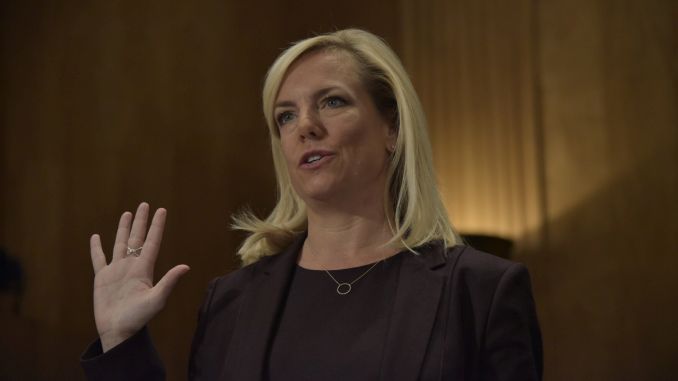
The New York Times reports that, before she was forced to resign earlier this month, Kirstjen Nielsen tried to focus the White House on threats from Russia in the 2020 election but was told not to bring it up in front of the president.
In a meeting earlier this year, Mick Mulvaney, acting White House chief of staff, made it clear to Nielsen that she should not bring up the subject of Russian election interference in the presence of President Trump because he equates it to questioning the legitimacy of his win in 2016. According to the Times, an administration quotes Mulvaney as saying it “wasn’t a great subject and should be kept below his level.”
Then-Secretary of Homeland Security Nielsen, believed that one of her highest priorities was to prepare for new and different malign Russian interference in the 2020 election. She twice called her own meetings of cabinet secretaries and department heads, including FBI, DOJ, and intelligence officials, to attempt to chart a comprehensive strategy after being blocked by the White House.
Nielsen, whose department was tasked with responsibility for cyberdefense, eventually gave up on trying to bring together cabinet secretaries at the White House to come up with a strategy to defend the next presidential election from Russia according to three current and one former senior administration officials.
Per Politico, Mick Mulvaney responded to the report from the Times, saying, “I don’t recall anything along those lines happening in any meeting.” He continued by pointing out that the White House is working to ensure that there will be no foreign interference in 2020. “Unlike the Obama administration, who knew about Russian actions in 2014 and did nothing, the Trump administration will not tolerate foreign interference in our elections, and we’ve already taken many steps to prevent it in the future.”
The Times points out that President Obama privately warned Putin in September 2016 at a meeting in China and issued sanctions on Russia and expelled 35 spies after the election.
While this administration has taken steps to thwart foreign influence campaigns, the reality is President Trump has also publicly stated his doubts in the intelligence community’s broad understanding of the vast levels of Russian interference in the 2016 election. He famously, at the Helsinki press conference with Vladimir Putin, said, “My people came to me, Dan Coats came to me and some others and said they think it’s Russia. I have President Putin. He just said it’s not Russia. I will say this. I don’t see any reason why it would be…” He has also regularly called Special Counsel Robert Mueller’s probe into the interference into the 2016 election, which has resulted in the indictment of 12 Russian nationals, 13 Russian military intelligence officers, and 3 Russian organizations, including the Kremlin linked Internet Research Agency, a “witch hunt”.
In addition, John Bolton, National security adviser, eliminated the position of White House cybersecurity coordinator last year. There is now no dedicated cybersecurity liaison between the Federal government and the private sector. One senior administration official described the adamant belief on behalf of homeland security officials that the government must significantly increase its efforts to warn the public of foreign influence campaigns as stymied by the White House’s refusal to address it. Nieslen, per the Times, “fumed” when the government shutdown furloughed nearly half of her cyberdefense staff.
An administration official told the Times that, after the midterms and after she had obviously fallen out of favor with President Trump for her perceived lack of toughness on immigration, Nielsen pushed for the 2020 election to be a priority to no avail. In part, her efforts to push for a focus on the upcoming election failed because national security aides resisted because the election was then two years away.
Page 7 of the Worldwide Threat Assessment, compiled by US intelligence agencies and submitted to Congress in January 2019, states, “We expect our adversaries and strategic competitors to refine their capabilities and add new tactics as they learn from each other’s experiences, suggesting the threat landscape could look very different in 2020 and future elections.”
In addition, the assessment points out that “Moscow is now staging cyber attack assets to allow it to disrupt or damage US civilian and military infrastructure during a crisis and poses a significant cyber influence threat” and goes on to say, “Russia’s social media efforts will continue to focus on aggravating social and racial tensions, undermining trust in authorities, and criticizing perceived anti-Russia politicians. Moscow may employ additional influence toolkits—such as spreading disinformation, conducting hack-andleak operations, or manipulating data—in a more targeted fashion to influence US policy, actions, and elections”.
Kevin T. Carroll, a former senior Homeland Security official during the Trump administration told the Times, “Russian intelligence’s 2016 covert actions to divide Americans by interfering in our election were so successful. Putin will amplify them in 2020.”
